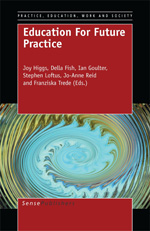 A new book, Education for Future Practice, co-edited by academics from Charles Sturt University (CSU), examines how university educators prepare people to work in the rapidly changing world of the 21st century, and is directed to university educators, scholars, practitioners and policy makers.
A new book, Education for Future Practice, co-edited by academics from Charles Sturt University (CSU), examines how university educators prepare people to work in the rapidly changing world of the 21st century, and is directed to university educators, scholars, practitioners and policy makers.One of the book’s co-editors, the Vice-Chancellor and President of CSU, Professor Ian Goulter, said, “The manner and effectiveness by which universities prepare the future professional workforce has received considerable attention in recent years by governments, employers and students. This book examines the theory and reality of preparing professionals for future practice and, in doing so, identifies both challenges and solutions.”
Co-editor Professor Joy Higgs, AM, from CSU’s Education For Practice Institute (EFPI) and CSU’s Research Institute for Professional Practice, Learning and Education (RIPPLE), said, “This book considers the relevant issues confronting universities as they adjust to the demands and expectations of practice and education in the 21st century.
“It brings together ideas at the cutting edge of our understanding of practice and the thinking that informs the ways in which higher education prepares people to participate in the world of skilled occupations and professions”.
“The authors explore theoretical and practical issues surrounding practice-based education. This includes the nature of practice, communities of practice, situated learning, practice and theory, work-based learning, and the role of discourse in forming and transforming practice and practitioners.”
Professor Higgs said future education involves the pursuit of shared visions and purpose in the midst of the turbulence created by many influences on education and practice.
“These influences arise from learners’ participation in multiple practice and learning communities, unpredictable workplaces, dynamic education and practice marketplaces, the various demands and interests of stakeholders, higher education imperatives, and unparalleled opportunities and expectations associated with advancing information and communication technologies.
“Of particular interest is how practice is learned, and how students are prepared for the workplace through engagement in professional socialisation, collaborative learning, inter-professional learning, learning organisations, evaluation of practice-based education and transcending the links between practice and research,” Professor Higgs said.





Social
Explore the world of social